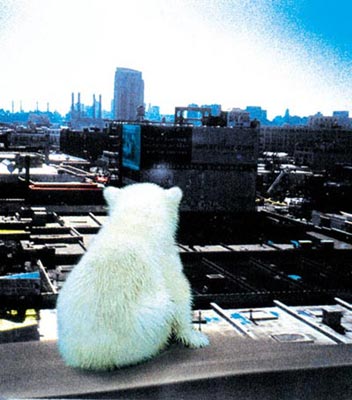Marjetica Potrc
dal 26/5/2005 al 30/6/2005
Segnalato da
26/5/2005
Marjetica Potrc
Nicolas Krupp, Basel
5 Ways to Urban Independence, Security and Privacy in City-States. ''There are two urban forms in the global city that I consider to be most successful namely, gated communities and shantytowns. Although formally they appear quite different, what they share is an emphasis on privacy and security. Moreover, and what I personally find interesting, both forms of community are initiated by individuals.'' M. Potrc

Five Ways to Urban Independence, Security and Privacy in City-States
There are two urban forms in the global city that I consider to be most successful – after all, as they growing the fastest – namely, gated communities and shantytowns. Although formally they appear quite different, what they share is an emphasis on privacy and security. Moreover, and what I personally find interesting, both forms of community are initiated by individuals. A good example to visualize is the city of Johannesburg after the end of apartheid. Townships exploded on the outskirts, while gated communities imploded inside the city.
After all, not everyone is happy living together in our single word. For those of us who have in some way or another become accustomed to the benefits of the social state, this might seem ironic. Nevertheless, I don’t think there is any point in being judgmental about it. Clearly, such phenomena are alive and well. Rather than talking about segregation, perhaps we should simply say that people like to live with others who are like themselves – with PLUs, “People Like Usâ€.
One might argue that the gated community is an archaic concept. But we should remember that one of the things people always admire when driving through Tuscany are the fortress-like Renaissance cities, perched strategically on the tops of hills. Not only do many gated communities look very much like such cities; they can be almost as difficult to enter as a Renaissance fortress.
Last year, when I visited Houston, Texas, I was quite taken with the gated communities on the outskirts of the city. Similar communities were envisioned by Thomas Moore in his Utopia, written in 1516. In More’s ideal world, cities on the island of Utopia are located approximately thirty-eight kilometers apart, that is, a six-hour walk. This is more or less the distance you see between the hill cities of Tuscany; it also happens to be the approximate distance between Houston’s gated communities and the downtown. The Utopians were obliged to change houses every then years, while Americans change their homes on the average of every five years. There is another similarity, too. The word “utopia†means “no placeâ€, and this is exactly how you feel while driving through a gated community; the houses could be easily interchanged, and it feels like you are nowhere in particular. No doubt the residents must feel this way, too.
Nicolas Krupp Contemporary Art Gallery
Erlenstrasse 15 - Basel



